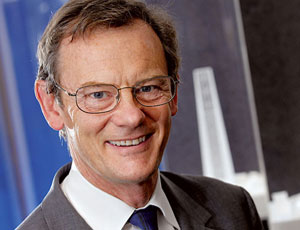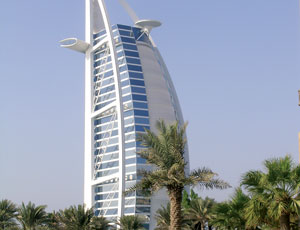For a company that began this decade losing most of its stock-market value and its chief executive, the U.K.’s W.S. Atkins plc seems to have learned the trick of keeping afloat in hard times. From being the lame duck of institutional investors, Europe’s largest design firm has become their darling, following recent news of better-than-expected financial performance in the face of global gloom. David Brockton, equities analyst with Arbuthnot Securities, London, says, “Atkins remains the best-placed (U.K.) consultant to withstand pressure in its markets and benefit when any demand improvement occurs.”

Group sales in the recessionary year to this March rose 13%, to about $2.4 billion, generating a 19% operating profit hike of $165 million. Cash balances are good, assesses Brockton, who is not alone in forecasting increasing share valuations in the investor-owned design firm.
Atkins is a designer and adviser in a wide range of infrastructure sectors, with a big architectural business. Most of its work is in the U.K., but it has operations in the U.S., the Middle East, China and continental Europe, with other projects sprinkled around the globe.
The firm’s relatively strong position stems from its work in resilient public-sector markets as well as the geographical reach of its business, believes Brockton. Further, chief executive Keith Clarke has been “massively important in getting it where it is today,” he adds.
Among Atkins’ recent public-sector gains is a contract to design all temporary venues and facilities for the London 2012 Olympic Games. The firm was already on the Games’ infrastructure design team. In joint ventures, the company this May won two design contracts for London’s 23-kilometer twin Crossrail tunnels and a major interchange.
Abroad, the firm’s main U.S. operation is “stable,” says Richard Hall, global managing director of the group’s cost consultant Faithful & Gould (F&G). “There is a little more confidence in the market and stimulus measures will start to flow into areas where we can do business,” he adds.
But the news has been less rosy for the group’s 1,200 global staff who lost their jobs to recession in the last year. The fact that Atkins’ payroll grew over 30% in the previous five years, and peaked at 18,600 employees, is small consolation.
Over the same boom, Atkins’ sales grew, on average, 11% annually and profits rose 4% faster. But with public-sector budgets bloated to unprecedented levels, the future for infrastructure firms is uncertain, cautions Brockton.
Recession “is not a recent phenomenon,” says Clarke. “We are going to bump along the bottom of the recession for at least two years in the U.K. and in many other parts of the world.”
Who will come out at the other end will depend on their quality, says Clarke. “If you know what your business...
























Post a comment to this article
Report Abusive Comment